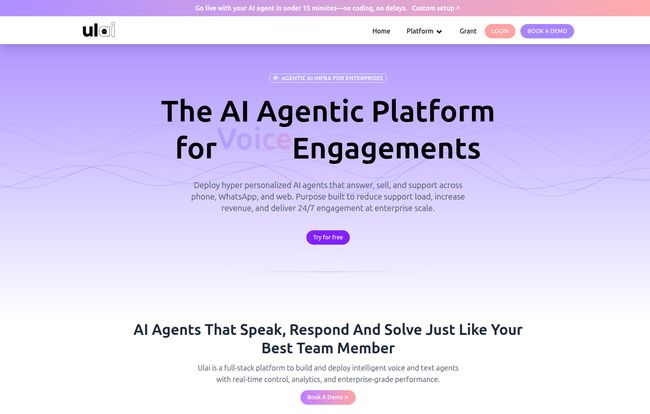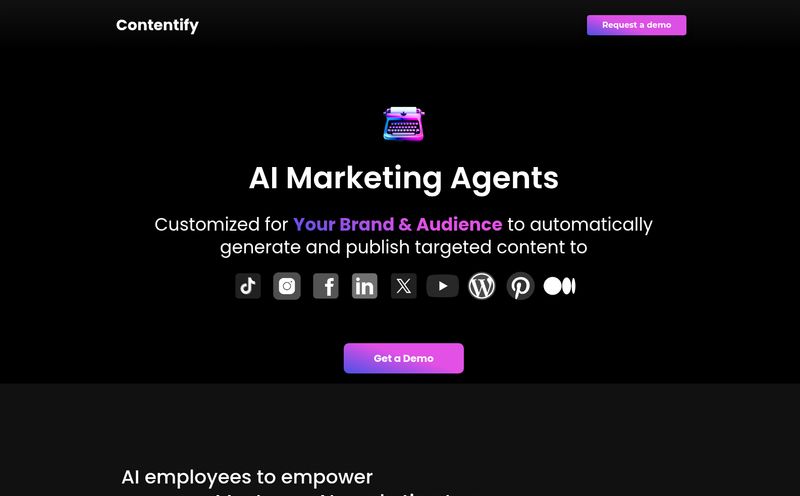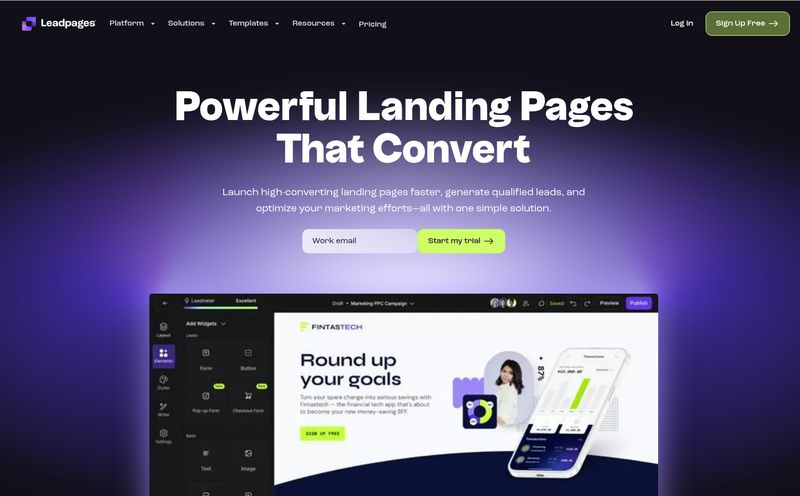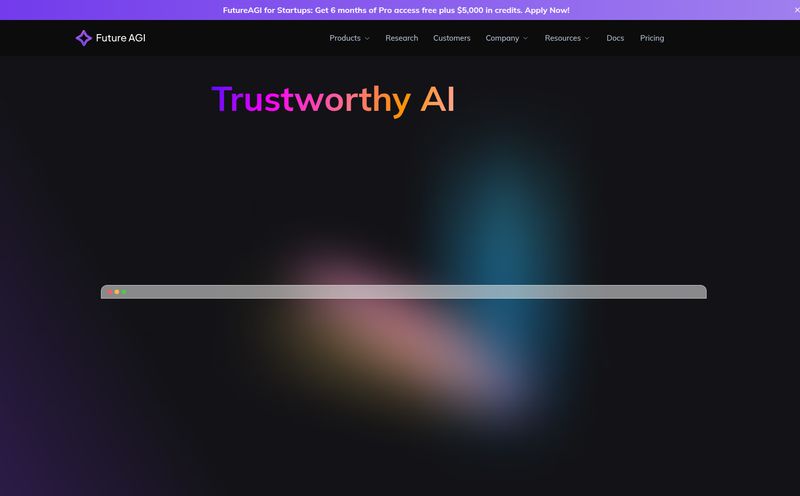As an e-commerce owner or marketer, you've probably tried a dozen different things to bump up your conversion rates. You’ve tweaked your CPC campaigns, A/B tested button colors until your eyes crossed, and maybe even installed one of those clunky, first-generation chatbots that mostly just annoyed people. We've all been there. The promise of automation is always so shiny, but the reality often feels... well, robotic.
Every so often, though, a tool comes along that makes me sit up and pay attention. Something that feels less like a bolted-on piece of tech and more like a genuine shift in how we do things. I've been digging into a platform called ulai lately, and I have to say, it's ticking a lot of the right boxes. It bills itself as a "GenAI Conversational Commerce Platform," which is a mouthful, I know. But stick with me. What it really means is an AI that doesn't just answer questions; it sells, supports, and engages just like a real human would. Maybe even better.
So, is this the silver bullet for scaling your D2C brand? Let's get into it.
So, What is Ulai, Anyway?
Imagine your best salesperson. You know the one—they’re charismatic, they know the product catalog inside and out, and they have an uncanny ability to know exactly what a customer needs before they do. Now, imagine you could clone that person and have them available 24/7 on your website, over text, and even on a voice call, speaking multiple languages. That’s the core idea behind ulai.
It’s not just a chatbot. I think we need to get that out of the way. We’ve all experienced the frustration of a bot that can only handle three keywords and hits you with “I’m sorry, I didn’t understand that” if you breathe on it wrong. Ulai is built on Generative AI, meaning it understands context, nuance, and intent. It holds a real conversation. It’s designed to be an agentic platform, meaning its AI agents can take actions—like applying a specific discount, finding a product, or initiating a return. It’s a proactive partner in the customer's shopping experience, not a passive Q&A machine.

Visit ulai
The Standout Features in This Conversational Commerce Platform
A tool is only as good as what it can actually do for you. I've seen a lot of platforms with flashy dashboards that don't move the needle. Ulai seems different, focusing on features that tie directly back to revenue and customer satisfaction.
More Than Just a Chatbot: True Conversational AI
This is the big one. Ulai’s agents are designed to handle the messy reality of human conversation. They can blend voice and text, handle interruptions (you know, when a customer starts talking before the AI is finished), and understand the natural back-and-forth of a discussion. This is what separates modern GenAI from the rigid scripts of the past. It’s the difference between a helpful conversation and a frustrating dead end for your customers.
Hyper-Personalization That Actually Converts
Personalization is a term that gets thrown around a lot, often just meaning it plugs the customer’s first name into an email. Yawn. Ulai aims for something deeper. By understanding the conversation, it can provide genuinely hyper-personalized product recommendations. It can even use what it calls "Smart AI Discounting," offering a strategic, timely discount to a hesitant buyer to nudge them over the finish line. This isn't about just slashing prices; it’s about using discounts intelligently to close a sale. This is where that bold claim of a 30% revenue uptick starts to sound a lot more plausible.
Omni-channel Support Without the Headache
A customer might start a conversation on your website's chat, then need to switch to their phone. With ulai, that’s all handled by a single, unified agent. The context isn't lost. This omni-channel approach—covering chat, voice, text, and email—creates a fluid experience. For the business, it means you’re not managing five different systems. For the customer, it means they feel heard and understood, no matter how they contact you. It also promises robust post-purchase support, handling everything from shipping queries to returns, which frees up your human support team for the really complex issues.
The No-Code Dream for Marketers
Okay, for my money, this might be the most exciting part. Ulai features a no/low-code workflow builder. This means people like you and me—the marketers, the founders, the ones who aren't developers—can build and deploy these sophisticated AI agents without writing a single line of code. You can design conversation flows, set up integrations, and customize the agent’s behavior through a visual interface. This democratizes powerful AI, taking it out of the exclusive hands of the IT department and putting it into the hands of the people who actually understand the customer.
The Real-World Impact on Your Bottom Line
Features are nice, but results are what pay the bills. So how does this all translate into business growth? It really comes down to a few key areas.
First, there's the obvious revenue boost and improved conversion. By proactively engaging customers, offering smart recommendations, and rescuing potentially abandoned carts with personalized incentives, ulai is designed to be a revenue-generating machine. Second, you get a massive increase in your ability to handle support volume at scale. Instead of hiring more agents during peak season, your AI agent can handle thousands of conversations at once, instantly. This directly reduces labor costs and improves efficiency. Finally, it's all about customer engagement and retention. A customer who has a smooth, helpful, and personalized experience is far more likely to come back. This AI doesn't just make a sale; it builds a better relationship with your audience.
How It All Comes Together
The platform seems to follow a pretty straightforward, logical process, which I appreciate. They break it down into four steps:
- Build: This is where you use the no-code builder to design your AI agent, defining its goals and personality.
- Test: You can simulate conversations and refine the agent's responses before it ever talks to a real customer.
- Deploy: You launch the agent onto your chosen channels (website, app, etc.) with what they claim is a simple integration process.
- Monitor: You get access to real-time analytics to see how the agent is performing, what customers are asking, and where you can make improvements.
This cycle of continuous improvement is critical. You’re not just setting it and forgetting it; you’re creating an asset that gets smarter over time.
The Big Question: What's the Catch and How Much?
Alright, let's talk about the elephant in the room: pricing. The ulai website doesn’t list any prices, which usually means one thing: it’s not a $20/month plugin. This is enterprise-grade software, and the pricing is likely customized based on your traffic, usage, and specific needs. You’ll have to book a demo to get a quote.
While some might see this as a con, I see it as positioning. This isn't a tool for someone just starting out on Shopify with ten sales a month. It’s for established D2C brands and e-commerce companies that have the volume to justify the investment. The question isn't "is it cheap?" but "does the ROI make sense?" If it can genuinely lift your revenue by double digits and cut your support costs, the price tag could be more than worth it.
The other consideration is implementation. Even with a no-code builder, you'll need to invest time to properly design and train your agent to reflect your brand's voice and policies. It's not magic; its a tool that requires strategy.
Frequently Asked Questions About Ulai
What exactly is ulai?
Ulai is a Generative AI platform designed for e-commerce. It provides intelligent AI agents that can handle sales conversations, customer support, and marketing engagement across channels like web chat, text, and voice.
How can ulai help my e-commerce business?
It helps in three main ways: increasing revenue through personalized selling and upselling, enhancing customer engagement and retention with 24/7 intelligent support, and scaling your support operations without proportionally increasing costs.
Is ulai suitable for small businesses?
While powerful, its main audience seems to be established D2C brands and larger e-commerce companies that have significant customer volume. Small businesses might find it to be more firepower than they need, but it's always worth requesting a demo to see if there's a fit.
How does ulai handle different languages?
The platform is built to be multilingual, allowing you to deploy agents that can speak your customers' language. This is a huge advantage for brands looking to expand their global reach.
Do I need a developer to integrate ulai?
Ulai emphasizes its no/low-code workflow builder and easy integration, meaning marketing or ops teams should be able to set it up without deep technical help. However, any initial integration will likely require some technical coordination.
What kind of analytics does ulai provide?
It offers real-time analytics so you can monitor agent performance, track conversion rates from conversations, and understand customer behavior to dynamically adjust your strategy.
My Final Thoughts on Ulai
Look, I'm naturally skeptical of tools that make huge promises. The e-commerce tech space is noisy. But ulai feels like it's built on a solid foundation. It's not just chasing the AI hype; it's applying advanced AI to solve the perennial problems of e-commerce: cart abandonment, low engagement, and overwhelmed support teams.
The move from rigid, script-based bots to fluid, generative conversational AI is the most significant shift in customer communication in a decade. Platforms like ulai are at the forefront of this change. If you're running a serious e-commerce operation and feel like you've hit a ceiling with your current tools, taking a closer look at a conversational commerce platform like this isn't just a good idea—it might be essential for future growth.



